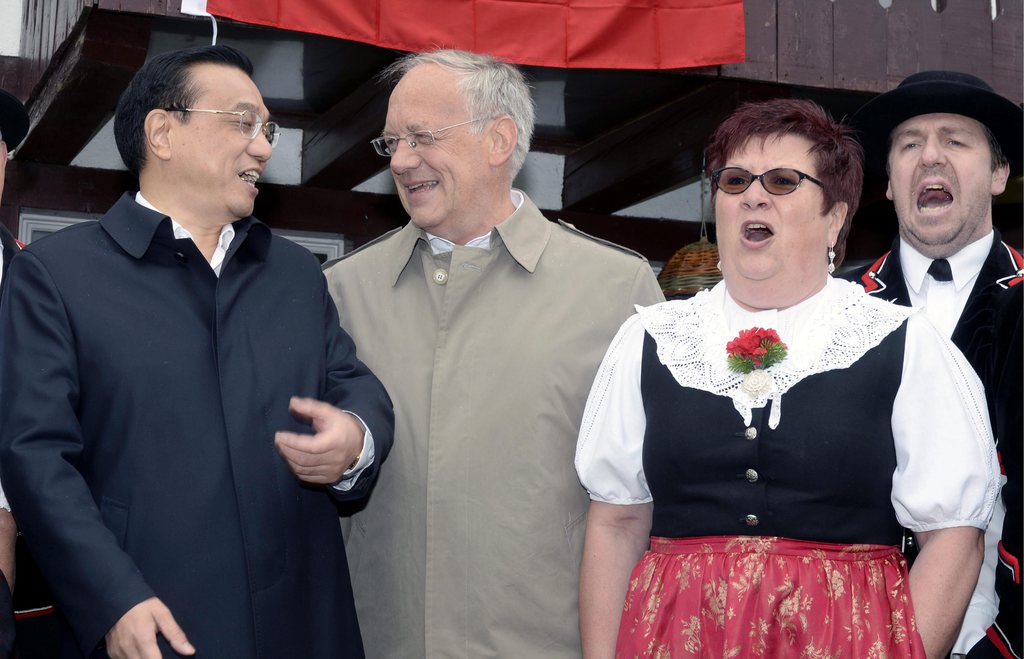Chinese leader holds out promise of more deals

Chinese Prime Minister Li Keqiang says a free trade accord with Switzerland should serve as an example for closer relations with other European countries. He believes a deal with the Swiss finance industry will also boost the economy in Switzerland.
The Chinese prime minister described talks with members of the Swiss government on Friday as open and friendly.
“They have led to a successful result,” he told a news conference outside Bern.
Li underlined the importance of the trade deal, to be signed later this year, both for the alpine nation and for continental Europe.
He said a series of declarations on financial issues, as well as on environmental matters, the watchmaking industry, sustainable development and education would further strengthen bilateral relations.
Li, who took charge as premier in March, arrived in Switzerland on Thursday evening on the first stop of his debut visit to Europe. On Saturday he heads to Germany, China’s main European trade partner.
Dialogue
The Chinese prime minister told reporters he hoped to further develop relations and extended an invitation to the Swiss government for a return visit.
He said talks on a broad range of issues had shown agreement in many areas. “There are no problems which can’t be solved through dialogue,” he added.
Swiss President Ueli Maurer in his statement described the free trade agreement as a “milestone in bilateral relations between the two countries”.
He underlined the friendly and open atmosphere in the talks as well as the mutual respect. He added both countries had a long-standing history of bilateral relations.
Maurer said the talks had included the issues of human rights and security.
Both sides signed a series of memorandums of understandings to bolster cooperation notably in finance, making Switzerland an offshore trading platform for the Chinese currency.
Switzerland in 1972 agreed a key trade accord with the EU and the European Free Trade Association.
It also concluded 26 similar accords with 35 other partners outside EU according to the State Secretariat for Economic Affairs.
Further deals on commercial relations are planned with a number of other countries, including India.
Experts have described the deal with China as the most important for Switzerland in 40 years.
Financial industry
During a meeting with top business leaders in Zurich earlier in the day, Li said: “We have found common ground and have overcome differences over the past two years.”
Li added that China’s economy had to grow and modernise. Switzerland was one of the countries which could benefit from it. He said Beijing was keen to boost cooperation with the Swiss financial sector.
Thomas Jordan, president of the Swiss National Bank, said the Swiss finance industry was interested in closer cooperation.
Economics Minister Johann Schneider-Ammann for his part said China was “a close friend” of Switzerland and its primary trading partner in Asia.
He said both negotiating teams had done a good job. The free trade deal is likely to be signed in July, according to Schneider-Ammann.
Tibetan protest
The visit by the Chinese government delegation to the capital, Bern, took place amid tight security. Police cordoned off the square outside the parliament building due to concerns about protests by Tibetans.
An estimated 250 people took part in a rally by the Tibetan community in Switzerland in the city centre out of sight of the Chinese delegation. The demonstrators called for freedom in Tibet and accused Beijing of human rights violations.
There are up to 5,000 Tibetans living in Switzerland today, one of the largest Tibetan communities in Europe.
A protest by Tibetan activists in 1999 outside parliament during a visit by then President Jiang Zemin to Switzerland led to a major diplomatic incident and strained bilateral relations for several months.

In compliance with the JTI standards
More: SWI swissinfo.ch certified by the Journalism Trust Initiative












You can find an overview of ongoing debates with our journalists here . Please join us!
If you want to start a conversation about a topic raised in this article or want to report factual errors, email us at english@swissinfo.ch.